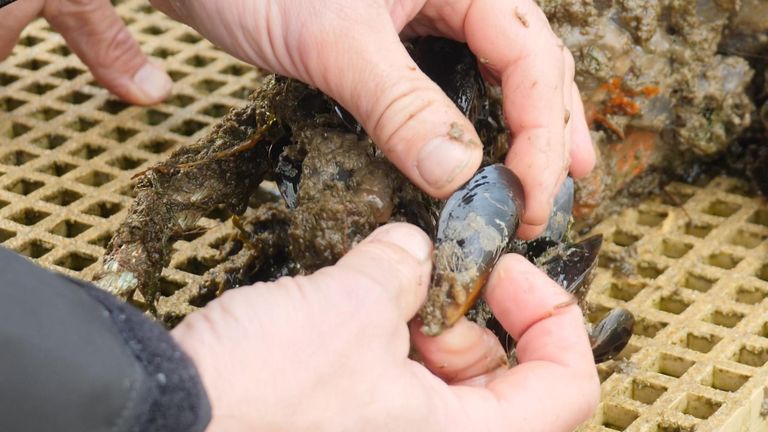Tiny fragments of glass fibre widely used to make small boats around the world have been found in the marine food chain for the first time.
Scientists at the universities of Portsmouth and Brighton found the glass shards, just a fraction of a millimetre long, in shellfish caught off the south coast of England.
The needle-shaped fragments of fibreglass, or glass reinforced plastic, were so sharp that some had speared biological tissue.
Professor Faye Couceiro, lead researcher and an expert in environmental pollution, told Sky News more research was urgently needed to understand the risk to people who consume oysters and mussels.
“The glass fibre is causing inflammation in all of the areas it is found (in the shellfish tissue),” she said.
“We don’t know what that means for human health yet. But it’s likely something similar will be happening, so the question is at what concentration does that become a problem.”
Fibreglass is a mesh of glass filaments that is embedded in plastic resin. The material is strong, light and easily shaped to make boats.
But when it is cut or sanded, or it degrades with age, it creates a fine dust of fibres which are easily washed into the sea.
The researchers studied oysters and mussels caught near an active boatyard in Chichester Harbour, a popular sailing destination in southern England.
Using a high-powered microscope they found up to 11,220 fibreglass particles per kilogram of oysters, and 2,740 per kilogram of mussels.
The vast majority were in the stomachs of the shellfish and would be expelled if they were put in clean water before being sold to consumers.
But several hundred glass fragments were found in the flesh and would have been consumed by anyone eating the mussel or oyster.
“I was surprised by the number,” Prof Couceiro said. “I don’t think it’s panic stage. Don’t stop eating them.”
But she added that the shellfish industry must now look at ways of cleaning out as many of the fragments as possible prior to consumption.
Oysters and mussels are already known to accumulate microplastic in their body tissues.
They are filter feeders, sucking in several litres of seawater every minute to extract particles of food.
But they also trap fibres and other fragments polluting coastal waters.
Gordon Watson, professor of marine zoology at the University of Portsmouth, said the fibres have a significant impact.
“These mussels grow more slowly,” he said.
“But they are also eaten by other organisms, like fish, and could pass the particles on, so they accumulate in the food chain.”
Although the research focused on shellfish near an active boatyard, the scientists said the problem was likely to be more widespread.
Prof Couceiro said fibreglass boats should be disposed of in landfill if they can’t be recycled at the end of their life.
“Landfill is expensive, so people drill a hole and the boat sinks to the bottom,” she said.
“If there was registration of vessels we would know who they belonged to and we would be able to make sure that they were disposed of properly,” she said.
“We need to prevent these particles getting into the environment.”



























